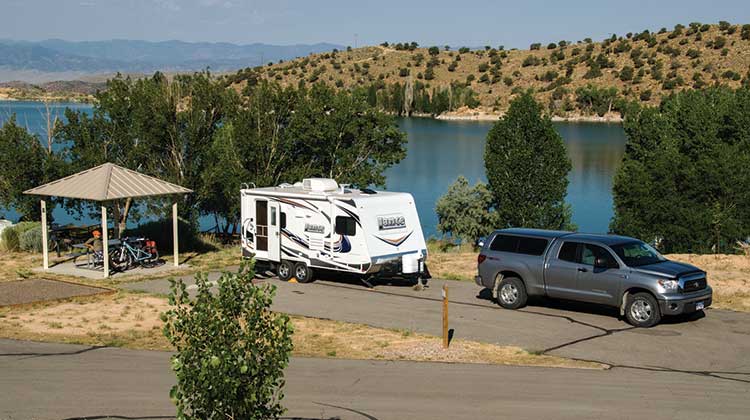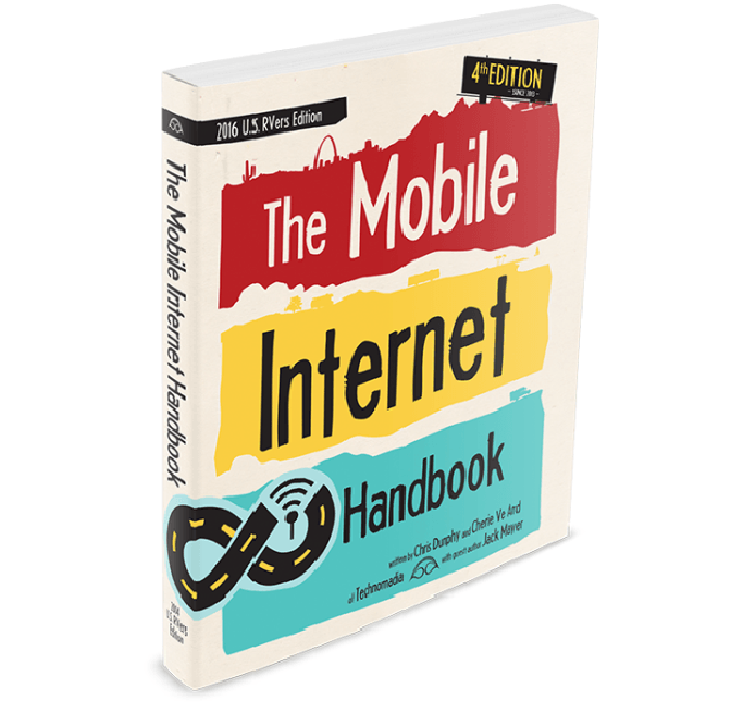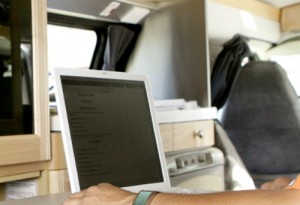
The latest version of The Mobile Internet Handbook by Technomadia’s Chris Dunphy and Cherie Ve Ard makes it easier to get online with wherever you roam. Photo Credit: Donna Ikenberry
There’s no way around it: RVing without the Internet is like living without water for many people: it’s impossible. From mapping out a route to video calls with the grandkids, modern living requires connectivity. Unfortunately, getting online when you go RVing is one of the biggest challenges of a life on wheels, but the latest version of The Mobile Internet Handbook by Technomadia’s Chris Dunphy and Cherie Ve Ard makes it easier to get online with wherever you roam.
 Most people don’t give their Internet connection a second thought when they’re at work or home. Much like the water that flows from our taps, it’s cheap and plentiful and we don’t usually monitor how much data we’re passing. Getting online when you go RVing is much like living under drought conditions. That’s because every bit of data your computers and mobile devices use while you’re traveling can cost significantly more. To add insult to injury, most providers place restrictions on how much data those devices can pass, a process known as throttling.
Most people don’t give their Internet connection a second thought when they’re at work or home. Much like the water that flows from our taps, it’s cheap and plentiful and we don’t usually monitor how much data we’re passing. Getting online when you go RVing is much like living under drought conditions. That’s because every bit of data your computers and mobile devices use while you’re traveling can cost significantly more. To add insult to injury, most providers place restrictions on how much data those devices can pass, a process known as throttling.
Maintaining a consistent, reliable Internet connection can be challenging, which is why The Mobile Internet Handbook is a huge help to anyone who wants to stay online while RVing.
Mobile Internet Handbook Quenches Your Thirst for the Internet
Co-written with RV tech guru Jack Mayer, the downloadable e-book is packed with an impressive 200+ pages of the most current information about getting online when you go RVing. The authors guide readers through the maze of choices by starting with the basics and pointing out important considerations like:
- Knowing how much data you’ll need
- What to consider when choosing a cellular plan
- Understanding mobile hotspots
- How to boost your cellular signal
- Tips for minimizing data usage
“There are multiple ways to access the internet while on the go these days, and each of them has attributes that might make one more attractive than the others.”
Whether you’re a tech novice or an experienced user who wants better ways to stay connected while RVing, the book has something in it for you. The book’s biggest strength for novices is a chapter called “Assembling Your Arsenal,” which guides readers through important questions to ponder while choosing an appropriate Internet access system for their lifestyle.
“There is currently no one single technology for keeping online that is appropriate for all the different situations mobile users might find themselves in.
The most fundamental key to success for staying connected while on the road is having multiple pipelines ready to try at each location. When Plan A is out of range or overloaded, Plan B suffers a hardware failure, a tree is blocking the signal to Plan C, and you ran over the wire to Plan D – what will you try next? How much redundancy do you need?
Each individual solution has its pros and cons, and will be more ideal in some locations than in others. Sometimes what works best in a given location even changes based on the time of day, or the weather. Your ideal arsenal is going to be very personalized to you and dependent upon several factors . . .”
While The Mobile Internet Handbook helps readers understand pros, cons and different ways to get online, the authors also reiterate the importance of being realistic about Internet connectivity on the road. That’s because even the best Internet setups have challenges in remote places, especially when too many users are attempting to get online at the same time. For those who rely on the Internet to check in with business matters, having backup methods to access the Internet is critical.
Geek Out with Techie Details
For more experienced Internet and computer users, the book has an assortment of technical chapters to satisfy your thirst for a better connection. For instance, the chapter written by Jack Mayer called “Antenna Selection and Installation” serves as a handy guide to finding your ideal antenna that will boost your WiFi and cellular connectivity signal.
“Antennas are key to successful mobile internet, for both Wi-Fi and cellular. The antenna you select, or that the manufacturer selects, has more influence on your internet experience than almost any other single piece of your equipment.”

The authors even discuss getting online while RVing in Mexico, Canada and other foreign countries. Photo courtesy of the RVIA
Since most people obtain cellular and WiFi connectivity through providers like Verizon and AT&T, The Mobile Internet Handbook focuses on this method of staying connected. For users who don’t want to be tied to cellular networks, the book briefly touches on mobile satellite Internet’s newest exciting developments. If you’re considering international travel, it even discusses getting online while RVing in Mexico, Canada and other foreign countries.
Additionally, the author’s membership-based online community, RV Mobile Internet, is available to help wade through the murky waters of mobile Internet. Pick up a copy of this handy guidebook, join the Mobile Internet community and you’ll always know how to stay online wherever you roam.

You are “spot on” with this review. Joining the RV Mobile Internet service is the best $$$ anyone that is serious about internet connection while traveling can spend. Their service includes a website where you can get your questions answered and learn what you need to know about staying connected on the road.
Through membership, many of us have learned how to obtain the coveted “Holy Grail” of internet connectivity: the Verizon Unlimited Data Plan. The pros and cons of other “special” data plans that are good for RVers are also discussed in depth.
Chris and Cherie also independently test (and report on) the equipment you need to stay connected: routers, antennas, boosters, etc. Where else can you find such unbiased information that “tells it like it is” and helps with buying decisions and understanding how it all works?
Kudos to Chris and Cherie!
The book is just icing on the cake, Subscribe to their service to get the most “bang for the buck”!
Wow, now that’s a great experience! Thanks for sharing.